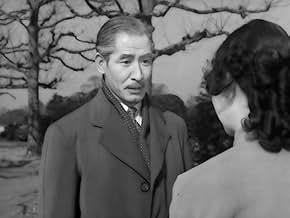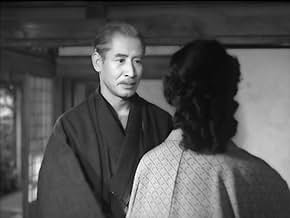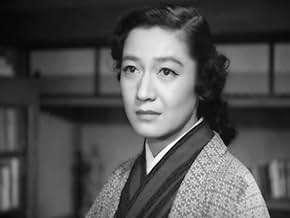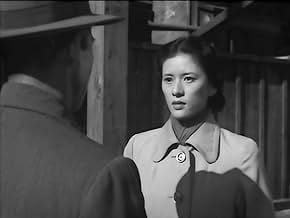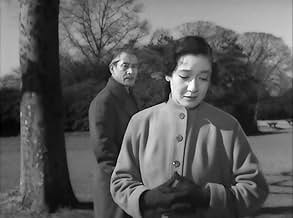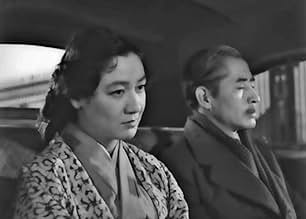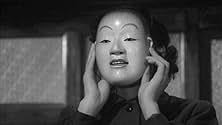IMDb-BEWERTUNG
7,7/10
2271
IHRE BEWERTUNG
Füge eine Handlung in deiner Sprache hinzuAn ingratiating bride develops warm ties to her father-in-law while her cold husband blithely slights her for another woman.An ingratiating bride develops warm ties to her father-in-law while her cold husband blithely slights her for another woman.An ingratiating bride develops warm ties to her father-in-law while her cold husband blithely slights her for another woman.
- Regie
- Drehbuch
- Hauptbesetzung
- Auszeichnungen
- 1 Gewinn & 1 Nominierung insgesamt
Empfohlene Bewertungen
This film tackles a subject that even today is controversial: Choice. Kikuko (the utterly amazing Setsuko Hara) is locked into a loveless marriage with her husband. They live with his parents, and it is particularly her father in law Shingo (Su Yamamura, who also is excellent) that she is closest to. Kikuko is a veritable maid, but mostly doesn't complain, while her husband is having an affair. You want Kikuko to confront him, but she doesn't. Then (this is where it gets controversial) Kikuko finds out she is pregnant, doesn't tell anyone and gets an abortion! Her reason is that its not the time to have a child, since her relationship is in flux. In the movie "Juno", Ellen Page brings the baby to term. The brilliance of this film is its unflinching subject and how its handled, with dignity, sadness and relief. If this film were released today, especially in the United States, you'd have so many interest groups up in arms about it. That its handled like this, with you deciding what to feel rather than having your feelings be dictated to you, makes this a masterpiece. In every review I've written in which she has been an actress I've praised Setsuko Hara. She is beautiful (especially when she smiles), but its really about the seemingly effortless way she portrays all types of women, strong, weak, resilient, unable to cope etc. She is one of the greatest actresses to have ever graced the screen and her portrayal is phenomenal as the under appreciated wife who makes a choice based on her circumstances. Director Mikio Naruse has always considered this one of his best films, and it is. Even if you're passionate about the "life" issue, see this film. I can't say enough about the acting of Ms. Hara in this film. The film is essential viewing.
This is a family drama. The story slowly unfolds to expose a complicated family dynamic. It can be a challenging watch for those who don't want to have to think too much.
I can't help but wonder if this movie was considered quite forward or daring or maybe even racy for its release date of 1954. If you're familiar with Japanese culture around this time, you know that tradition ruled and emotions and personal issues were skirted around and rarely confronted head on. The norm was to internalize everything. This movie actually does the opposite, and it does it expertly.
Well acted. Directed with perfection. Poignant dialogue. And composer Ichiro Saito nails the music score with a wonderfully romantic quality. My only critique is the editing is a bit choppy in spots, but it doesn't detract from the overall genius of the film.
I can't help but wonder if this movie was considered quite forward or daring or maybe even racy for its release date of 1954. If you're familiar with Japanese culture around this time, you know that tradition ruled and emotions and personal issues were skirted around and rarely confronted head on. The norm was to internalize everything. This movie actually does the opposite, and it does it expertly.
Well acted. Directed with perfection. Poignant dialogue. And composer Ichiro Saito nails the music score with a wonderfully romantic quality. My only critique is the editing is a bit choppy in spots, but it doesn't detract from the overall genius of the film.
I admit it. I'm a sucker for this type of movie. Old black-and-white film, well-acted and scripted, whether Japanese or American, and I'm lost.
Even better, this one has some top-notch dialogue. The scene where the father confronts the brassy mistress of his son has dialogue worthy of more than one Hollywood greats.
This film is a terrific high-class soap opera which brutally examines fracturing personal relationships in one family in post-war Japan. The previous reviewer implies that this is not among this director's great work. All I can say is, if this is a middling effort, then I for one have much movie-viewing pleasure ahead.
Highly recommended.
Even better, this one has some top-notch dialogue. The scene where the father confronts the brassy mistress of his son has dialogue worthy of more than one Hollywood greats.
This film is a terrific high-class soap opera which brutally examines fracturing personal relationships in one family in post-war Japan. The previous reviewer implies that this is not among this director's great work. All I can say is, if this is a middling effort, then I for one have much movie-viewing pleasure ahead.
Highly recommended.
The businessman Ogata Shingo (Sô Yamamura) works with his son Shuichi (Ken Uehara), who is his secretary, and they live together in the suburb with their wives Yasuko (Teruko Nagaoka) and Kikuko (Setsuko Hara) respectively. Shuichi has a love affair and has a loveless marriage with Kikuko. Yasuko has dedicated her entire life to her family but Shingo married her only because her older sister had died. Kikuko is the pride and joy of Shingo and they are close to each other.
Out of the blue, Shingo and Yasuko's daughter Fusako (Chieko Nakakita) leaves her husband and arrives at Shingo's home with her two children. Shingo investigates and finds the address of Shuichi's lover. Meanwhile Kikuko goes to the hospital and Shingo learns that she was pregnant but decided to abort her child.
"Yama no oto" is a movie about forbidden love based on the novel of Yasumari Kawabata and directed by Mikio Naruse that uses the favorite theme of Ozu – the family drama - and similar locations. The story is based on the patriarch Shingo, a man that has married his wife without loving her but also respected her along their lives. He feels a forbidden love with his sister-in-law Kikuko, a woman that is apparently submissive working as a servant at home, but strong enough to abort her child to avoid keeping her loveless marriage with her husband. Fusako is Shingo's estranged daughter that is also strong enough to leave her husband and move with her children to her parents' home. This women behavior is unusual in Japanese movies from these years. My vote is eight.
Title (Brazil): "O Som da Montanha" ("The Sound of the Mountain")
Out of the blue, Shingo and Yasuko's daughter Fusako (Chieko Nakakita) leaves her husband and arrives at Shingo's home with her two children. Shingo investigates and finds the address of Shuichi's lover. Meanwhile Kikuko goes to the hospital and Shingo learns that she was pregnant but decided to abort her child.
"Yama no oto" is a movie about forbidden love based on the novel of Yasumari Kawabata and directed by Mikio Naruse that uses the favorite theme of Ozu – the family drama - and similar locations. The story is based on the patriarch Shingo, a man that has married his wife without loving her but also respected her along their lives. He feels a forbidden love with his sister-in-law Kikuko, a woman that is apparently submissive working as a servant at home, but strong enough to abort her child to avoid keeping her loveless marriage with her husband. Fusako is Shingo's estranged daughter that is also strong enough to leave her husband and move with her children to her parents' home. This women behavior is unusual in Japanese movies from these years. My vote is eight.
Title (Brazil): "O Som da Montanha" ("The Sound of the Mountain")
An honest look at marriage, adultery, divorce, and abortion, especially refreshing for 1954, and with the emotions between an elderly man (So Yamamura) and his daughter-in-law (Setsuko Hara) poignantly rendered. His son / her husband (Ken Uehara) is a real piece of work, brazenly carrying on with other women, staying out late, and getting physically abusive when they don't do as he wishes (referred to, not shown). Meanwhile the man's daughter is also in a broken marriage, returning home with her two children because her husband's cheating on her. The film calls out bad male behavior by showing its impact, and the conversations between characters feels fairly modern.
One of the things altered relative to Yasunari Kawabata's novel is the elderly man's mental state, which in this adaptation isn't declining with age, with accompanying melancholy. Another is his relationship with his daughter-in-law; clearly they have a connection in the film, but it's based on simple kindness and admiration, and erotic feelings on his part aren't involved. The result is a character who is on the surface a decent old man, still married to his own wife despite his own indiscretions and having been more attracted to her older sister long ago. He's not particularly effective in reining in his son, however, and he doesn't give his own daughter enough affection or attention, reserving those things for his daughter-in-law. In that sense he's failed in life.
As in many of her films, Setsuko Hara is the brightest light in the cast. Her character is simple, kind, and filial (derisively referred to as "childlike" by her husband), but shows a toughness in the actions she takes. Hara brings out the emotions very well, and while the ending gets a little melodramatic, it has power. Overall, just a very well done, well-paced film from Mikio Naruse.
One of the things altered relative to Yasunari Kawabata's novel is the elderly man's mental state, which in this adaptation isn't declining with age, with accompanying melancholy. Another is his relationship with his daughter-in-law; clearly they have a connection in the film, but it's based on simple kindness and admiration, and erotic feelings on his part aren't involved. The result is a character who is on the surface a decent old man, still married to his own wife despite his own indiscretions and having been more attracted to her older sister long ago. He's not particularly effective in reining in his son, however, and he doesn't give his own daughter enough affection or attention, reserving those things for his daughter-in-law. In that sense he's failed in life.
As in many of her films, Setsuko Hara is the brightest light in the cast. Her character is simple, kind, and filial (derisively referred to as "childlike" by her husband), but shows a toughness in the actions she takes. Hara brings out the emotions very well, and while the ending gets a little melodramatic, it has power. Overall, just a very well done, well-paced film from Mikio Naruse.
Wusstest du schon
- WissenswertesSô Yamamura, who portrays Shingo the father, was actually one year younger than Ken Uehara, who portrayed his son Shuichi.
- Zitate
Fusako Aihara: What do you think, Father? You're busy reading the newspaper. Nobody really cares about my troubles.
Shingo Ogata: I don't know what to say. From the outside, you can never tell what's really going on in a marriage.
Top-Auswahl
Melde dich zum Bewerten an und greife auf die Watchlist für personalisierte Empfehlungen zu.
Details
- Erscheinungsdatum
- Herkunftsland
- Sprache
- Auch bekannt als
- Sound of the Mountain
- Produktionsfirma
- Weitere beteiligte Unternehmen bei IMDbPro anzeigen
- Laufzeit1 Stunde 35 Minuten
- Farbe
- Sound-Mix
- Seitenverhältnis
- 1.37 : 1
Zu dieser Seite beitragen
Bearbeitung vorschlagen oder fehlenden Inhalt hinzufügen


